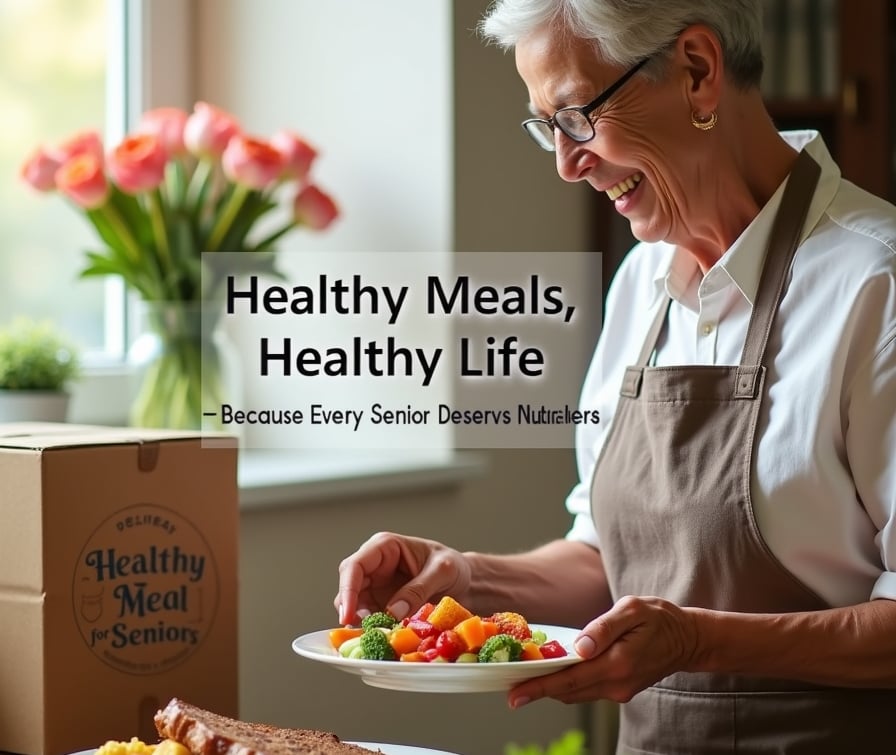Poor Nutrition in Seniors: How Healthy Eating Can Transform Aging with Strengt
“Poor nutrition in seniors is a growing health concern — but it can be prevented. Discover practical solutions like meal delivery programs, senior cooking classes, and dietitian support to promote healthy aging, boost energy, and restore independence.
Javed Niamat
10/18/20254 min read


Poor Nutrition in Seniors: How Healthy Eating Can Transform Aging with Strength and Dignity:
Growing older brings wisdom, stories, and cherished memories — but it also brings unique health challenges. One of the most overlooked issues among seniors is poor nutrition.
Many older adults simply aren’t getting the nutrients their bodies need to stay healthy. This can lead to weakness, fatigue, illness, and a lower quality of life. But the good news is: with the right support systems, meal programs, and guidance, seniors can reclaim their energy, independence, and health.
Why Poor Nutrition Happens in Older Adults
Nutrition isn’t just about food — it’s also about access, knowledge, and daily habits. Many seniors face multiple barriers that make it hard to eat well.
Common causes include:
Limited mobility – Difficulty shopping or cooking.
Fixed income – Limited money for fresh produce or quality meals.
Health issues – Dental problems, loss of appetite, or chronic illness.
Social isolation – Eating alone often leads to less motivation to prepare nutritious meals.
Cognitive decline – Forgetting to eat or struggling with meal planning.
According to the National Council on Aging (NCOA), about 1 in 2 older adults is at risk of malnutrition. That number is even higher among those who live alone or have chronic illnesses.
The Hidden Dangers of Poor Nutrition
Poor nutrition doesn’t just cause weight loss or fatigue. It can weaken every system in the body, making seniors more vulnerable to health problems.
Some serious risks include:
Increased frailty and risk of falls
Weakened immune system
Slower wound healing
Worsening of chronic diseases like diabetes and heart conditions
Increased risk of hospitalization
Example:
Mr. Ahmed, 78, lived alone and often skipped meals because it felt like “too much work.” Over time, his energy dropped, and he lost weight rapidly. A neighbor encouraged him to join a senior meal delivery program. Within weeks, his health and mood improved dramatically — not just because of the food, but also the daily connection with others.
What a Healthy Senior Diet Should Include
Older adults have different nutritional needs than younger people. A balanced diet should provide enough protein, vitamins, minerals, and fiber to support energy, bone strength, and immunity.
Essential nutrients for seniors:
Protein: To maintain muscle mass (lean meat, fish, eggs, beans)
Calcium & Vitamin D: For strong bones (milk, fortified foods, sunlight)
Fiber: For healthy digestion (fruits, vegetables, whole grains)
Omega-3 fatty acids: To support brain and heart health (salmon, walnuts, flaxseeds)
B vitamins: To support brain function and energy (leafy greens, whole grains)
Tip: Small, frequent meals often work better for seniors than large meals.
(External Resource: National Institute on Aging)
Practical Solutions to Senior Malnutrition
The good news is, poor nutrition can be prevented and reversed. With the right support systems, even seniors on a limited income or with health challenges can eat well again.
1. Meal Delivery Programs
For seniors who struggle to shop or cook, meal delivery programs are life-changing.
These services provide nutritious, ready-to-eat meals delivered right to the door.
Benefits:
No need to cook or shop
Meals meet nutritional needs for seniors
Regular delivery helps ensure they don’t skip meals
Many programs are low-cost or free for those who qualify
Example programs in the U.S.:
2. Senior Cooking Classes
Cooking classes designed for older adults are becoming more popular. These programs not only teach easy, affordable recipes, but also make cooking fun again.
Benefits:
Encourages independence and confidence
Helps seniors try new foods
Creates social opportunities and friendships
Teaches how to cook for one or two people
Local senior centers or community colleges often offer these classes free or at a low cost.
3. Dietitian Consultations
Registered dietitians can design personalized meal plans that match health needs and budgets. This is especially helpful for seniors with:
Diabetes
High blood pressure
Heart disease
Difficulty chewing or swallowing
A dietitian can help find the right foods and show how to make simple changes that improve overall health.
(External Resource: Academy of Nutrition and Dietetics)
4. Social Support and Companionship
Many seniors skip meals simply because they don’t want to eat alone.
Simple solutions like:
Shared meals with neighbors or friends
Community lunch programs
Church or community potlucks
…can make eating feel joyful again — and encourage better nutrition.
Tips for Seniors to Improve Daily Nutrition
Keep healthy snacks like fruit, nuts, or yogurt handy.
Drink plenty of water throughout the day.
Use frozen vegetables or pre-cut produce to make cooking easier.
Plan weekly meals ahead of time.
Make eating a social activity whenever possible.
Don’t be afraid to ask for help — it’s a sign of strength, not weakness.
Emotional Impact: More Than Just Food
For seniors, eating well isn’t just about health — it’s about feeling cared for, valued, and connected.
When seniors have access to nutritious meals and the support they need, they gain:
More energy to stay active
Better mood and mental clarity
Improved confidence and independence
A stronger sense of dignity
Good nutrition is one of the most powerful tools for aging well.
Conclusion: Every Senior Deserves a Nourishing Life
Poor nutrition in older adults is a serious problem — but it’s also a solvable one. With meal delivery programs, senior cooking classes, dietitian consultations, and strong community support, seniors can thrive in their golden years.
No one should face aging on an empty stomach or a lonely plate.
Because food is not just fuel — it’s comfort, health, and connection.
Suggested Internal Links:
Loneliness in Seniors — The link between isolation and poor health
Mobility Issues — Overcoming physical barriers to independence
Budgeting for Seniors — Making the most of fixed incomes